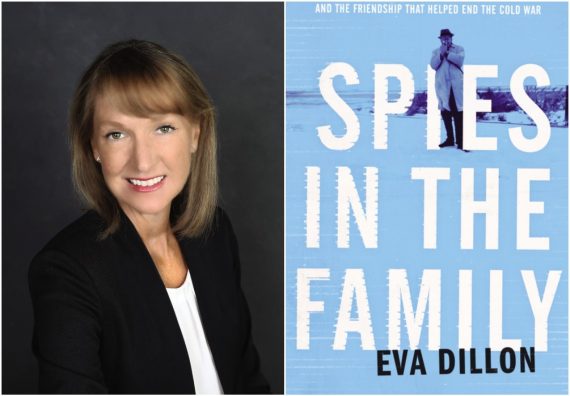
(5-25-17) Ever wonder what it is like to be the daughter of a CIA officer – and not just any ordinary operative but one who actually helped keep the Cold War from turning hot?
Eva Dillon has written an exceptional book called Spies in the Family: An American Spymaster, His Russian Crown Jewel, And the Friendship That Helped End the Cold War.
Before I started focusing almost exclusively on mental illness and my novels, I published nonfiction books about American traitors. One was CIA turncoat Aldrich Ames, who plays a critical role in Dillon’s book so I was especially eager to read her account.
Dillon’s story focuses on two men. Soviet Major General Dmitri Polyakov was the most important Russian “asset” who worked for us during the Cold War, and Dillon’s father, Paul Leo Dillon, was his CIA handler.
To understand why her new book is both an excellent read and important, you must understand what Gen. Polyakov did for our nation. He was the United States’ highest-ranking, longest-serving Soviet double agent during the Cold War. James Woolsey, Director of CIA under President Clinton, called him the “jewel in the crown”who “kept the Cold War from becoming hot.”
My CIA contacts have told me that Polyakov’s disclosures alone filled an entire room full of file cabinets.
The second thing you must realize is Dillon has written a true insider book describing the mental toll it took on her father handling such a valuable “asset” who was in constant danger.
Dillon interviewed me for her book because Aldrich Ames was responsible for Polyakov’s arrest by the Soviet KGB. While the Kremlin had its suspicions for years, it was Ames who confirmed that the general had spied for us – a fact Ames told them even though Polyakov had retired from the GRU (Soviet military intelligence) and was an older man. Ames knew in disclosing Polyakov’s past, the general would be executed. Yet, Ames offered up Polyakov’s name simply to line his pockets and impress his new Kremlin “friends.” (In case you are wondering, Polyakov betrayed the Soviet empire for philosophical reasons not cash.)
In her book, Dillon reveals a previously undisclosed fact about a small role I played in the Polyakov matter that led to an incredibly ironic moment in my life as a spy writer when I was invited to Langley to witness a ceremony honoring Polyakov in a board room filled with top CIA officials who had declined to speak to me when I was researching my book about Ames.
Dillon, a former president of Reader’s Digest, earned a starred Kirkus Review for her book, a tough feat, and a well-deserved honor because her story makes a significant contribution to non-fiction spy literature and also takes lucky readers on a fascinating journey as she investigates her father’s secret role in Cold War spying.
Spies in the Family: An American Spymaster, His Russian Crown Jewel, And the Friendship That Helped End the Cold War is a most welcomed summer read.
Here is the Kirkus Review.
KIRKUS REVIEW
The intense and intimate story of espionage involving Soviet and American agents; one of the latter was the author’s father.
Dillon, a veteran journalist who served as the president of Reader’s Digest and has worked for Vogue, Harper’s, the New Yorker, and other publications, debuts with a tale full of intrigue, ignorance, treason, treachery, family, greed, and loyalty—to country, to lucre, to human rights. The author tells us about two families: her own and that of Dmitri Fedorovich Polyakov, a high-ranking Soviet intelligence official, who, for decades, shared critical information with his American counterparts, including Dillon’s father. With detail and technique that are almost novelistic, the author alternates the stories of the two families and describes her awareness, much later on, that her father was a CIA agent. Appearing in the text are some names familiar to followers of spy stories: Kim Philby, Philip Agee, and, most grievously in this particular story, Aldrich Ames. Using multiple interviews of principals and her comprehensive research, Dillon shows the internecine battles within the CIA, the fierce paranoia evident among many on both sides of the Iron Curtain, and the failure of intelligence officials to see the traitorous behavior that, in some cases, was flaring prominently. Ames, for example, was living a life that was far beyond his means, yet it took years for his superiors to catch on; likewise, the Soviets could not believe that a decorated hero like Polyakov would betray his country. Throughout the narrative, the author weaves the personal family stories of both of her principals—her own, of course, but she awards special attention to Polyakov’s son, Alexander, who also was working in intelligence but was unaware of his father’s alliances. We know the outcomes, so the dramatic irony is piercing.
Reads like a fine spy novel whose ending we know but whose story transports us nonetheless.



